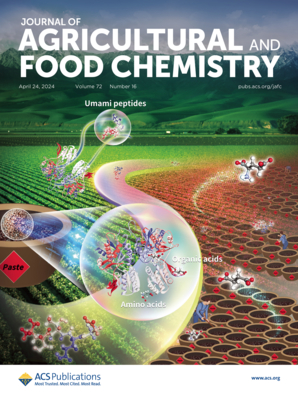Investigation of the Mitigating Mechanism of Bifidobacterium longum 300 in d-Galactose-Induced Cognitive Impairment in Mice
IF 5.7
1区 农林科学
Q1 AGRICULTURE, MULTIDISCIPLINARY
引用次数: 0
Abstract
People’s aging is accompanied by cognitive impairment, especially the decline in learning and memory ability. Probiotics have potential health-promoting functions in this regard. In this study, the function of Bifidobacterium longum 300 (BL300) in reducing cognitive impairment of mice induced via d-galactose was evaluated, and the mitigating mechanism of this function was deeply researched. Treatment with BL300 significantly enhanced the nesting ability of the mice, increased their time spent in the target quadrant of the water maze, and reduced the number of errors in passive avoidance tests (PAT). Notably, BL300 treatment facilitated recovery in the gut microbiota composition by increasing beneficial microbial populations (e.g., Lactobacillus) and decreasing pathogenic bacteria. Importantly, compared to mice treated with d-galactose, the indices of inflammation and acetylcholinesterase levels in the hippocampus and serum were decreased, along with a downregulation of pro-inflammatory cytokines in the brain (such as TNF-α and IL-6) when they were fed with BL300. Furthermore, the administration of BL300 resulted in an increase in the populations of BDNF+ and NeuN+ cells in the hippocampus and reduced intestinal permeability. Therefore, this study provides compelling evidence for the BL300 can reduce cognitive decline, and BL300 would be regarded as a potential probiotic for alleviating cognitive impairment.

长双歧杆菌300对d-半乳糖所致小鼠认知功能障碍的缓解机制研究
人的衰老伴随着认知障碍,尤其是学习记忆能力的下降。在这方面,益生菌具有潜在的健康促进功能。本研究评估了长双歧杆菌300 (Bifidobacterium longgum 300, BL300)对d-半乳糖诱导的小鼠认知功能损伤的减轻作用,并对其减轻作用机制进行了深入研究。BL300显著提高了小鼠的筑巢能力,增加了小鼠在水迷宫目标象限的停留时间,减少了被动回避测试(PAT)的错误次数。值得注意的是,BL300处理通过增加有益微生物种群(如乳酸杆菌)和减少致病菌,促进了肠道微生物群组成的恢复。重要的是,与d-半乳糖处理的小鼠相比,饲喂BL300的小鼠海马和血清中炎症指数和乙酰胆碱酯酶水平降低,同时大脑中促炎细胞因子(如TNF-α和IL-6)下调。此外,给药BL300导致海马中BDNF+和NeuN+细胞数量增加,肠道通透性降低。因此,本研究为BL300可以减轻认知能力下降提供了强有力的证据,BL300可以作为一种潜在的缓解认知障碍的益生菌。
本文章由计算机程序翻译,如有差异,请以英文原文为准。
求助全文
约1分钟内获得全文
求助全文
来源期刊
CiteScore
9.90
自引率
8.20%
发文量
1375
审稿时长
2.3 months
期刊介绍:
The Journal of Agricultural and Food Chemistry publishes high-quality, cutting edge original research representing complete studies and research advances dealing with the chemistry and biochemistry of agriculture and food. The Journal also encourages papers with chemistry and/or biochemistry as a major component combined with biological/sensory/nutritional/toxicological evaluation related to agriculture and/or food.

 求助内容:
求助内容: 应助结果提醒方式:
应助结果提醒方式:


